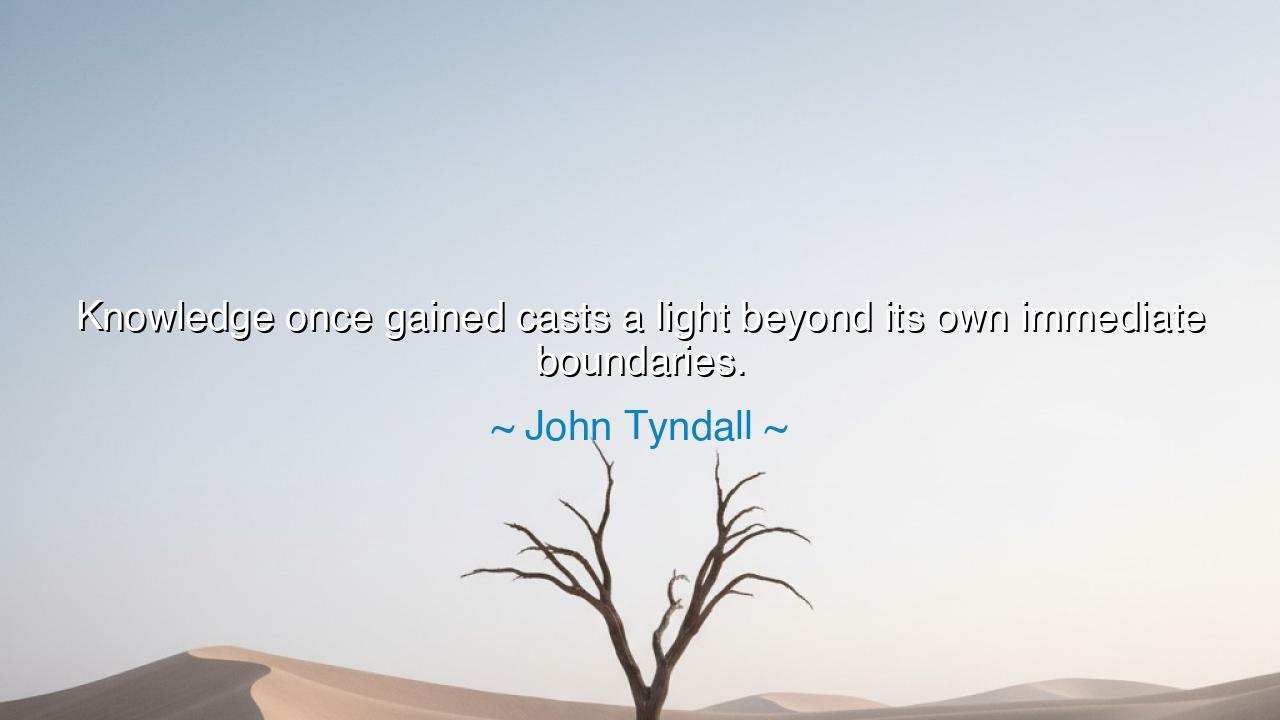
Knowledge once gained casts a light beyond its own immediate






John Tyndall, the physicist and seeker of truth, once proclaimed: “Knowledge once gained casts a light beyond its own immediate boundaries.” These words are like a flame carried in darkness, for they teach us that learning is never confined to a single corner of the mind. Every fragment of knowledge opens doors we did not see before, spreading illumination into realms we had not imagined. What begins as a spark of understanding grows into a radiance that touches not only the present but the future, not only one life but many.
The origin of this wisdom is found in the life of Tyndall himself. A man of science in the nineteenth century, he studied the mysteries of heat, sound, and light. His experiments on the scattering of light in the atmosphere helped humanity understand why the sky is blue. Yet his discoveries were more than curiosities; they influenced other sciences, from meteorology to physics, and even helped prepare the ground for Einstein’s later theories. Thus he saw firsthand that once knowledge is uncovered, it cannot be contained—it radiates outward, shining upon fields far beyond its birthplace.
History itself provides countless examples. Consider Isaac Newton, who sought merely to understand falling apples and the motion of planets. The knowledge he gained in the law of gravity cast a light far beyond astronomy—it shaped navigation, engineering, architecture, and even the very way humanity understood its place in the cosmos. What began as the study of motion became the foundation of modern science. This is the meaning of Tyndall’s words: the true power of knowledge lies not in its immediate answer, but in the new questions it awakens, the new horizons it unveils.
The ancients too perceived this truth. In the sacred halls of Alexandria, scholars copied texts from every land, knowing that even the smallest fragment of wisdom might yield treasures in generations to come. A single verse of mathematics could aid the building of bridges; a single line of philosophy could shape governments and laws. The light of knowledge always spills beyond the chamber in which it was first kindled, and those who hoard it in silence betray its very nature. For wisdom longs to shine, to radiate, to serve.
The deeper meaning of Tyndall’s words is that knowledge is not a possession but a seed. When planted, it grows branches that reach far beyond its roots. You may study one craft, and yet that learning will influence another. A poet who studies history writes with deeper truth. A doctor who learns music heals with gentler hands. Every act of learning expands the soul’s vision, casting light not only where we intended to look but into corners we did not even know existed. This is why the pursuit of wisdom is sacred—it transforms the seeker in ways unseen.
The lesson for us is radiant: never despise small learnings, never think a truth useless. What you learn today, even if it seems narrow, may one day cast its light upon problems you have not yet faced. A student struggling through numbers may one day design bridges that save lives. A child reading stories may one day lead nations with empathy. Do not measure knowledge only by its immediate use—measure it by the horizons it opens.
Practical action is clear: pursue learning not only in the field you love, but also beyond. Let curiosity guide you into science, art, history, and philosophy. Share what you learn, for the light of knowledge is brightest when multiplied. Reflect on what you discover, asking how it connects to other parts of life. And above all, remain humble, for every truth you gain is but one spark in the vast fire of wisdom, whose glow will outlast you and spread to generations yet unborn.
Thus Tyndall’s words stand as a beacon: knowledge, once gained, is not confined—it shines outward, breaks its chains, and lights paths that others may walk. Let us then seek it with diligence, share it with generosity, and trust that its radiance will reach farther than we can see. For in this lies the greatness of humanity: that we kindle lights not only for ourselves, but for the world and for ages to come.






AAdministratorAdministrator
Welcome, honored guests. Please leave a comment, we will respond soon